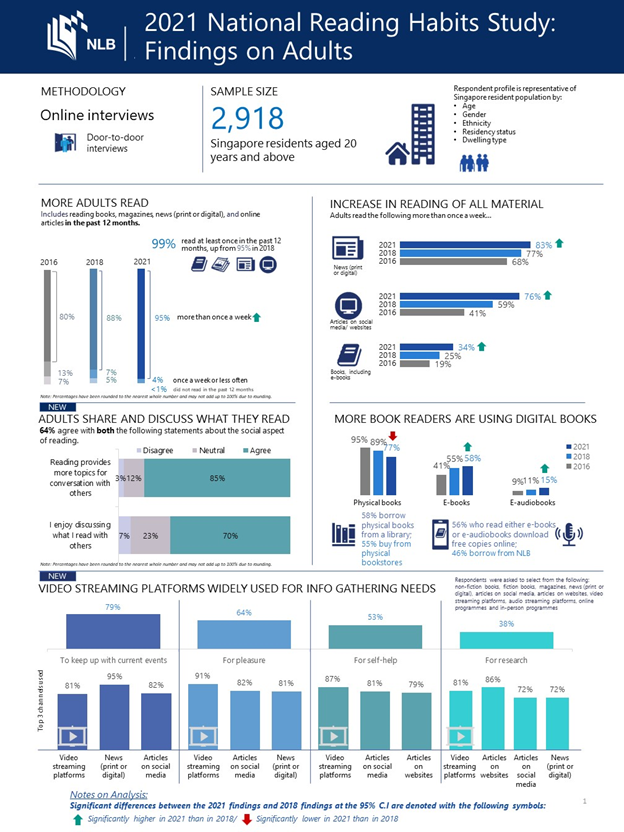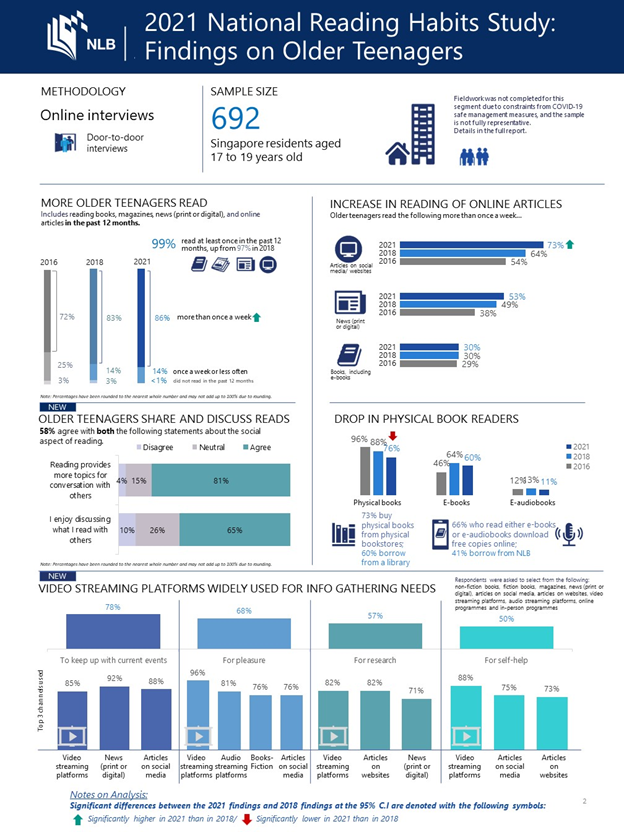More Singapore Residents Read For Leisure And Going For Digital Content
Findings from NLB’s National Reading Habits Study 2021 will drive its outreach and programmes to cater to evolving reading trends
Singapore, 10 October 2022 – The National Library Board’s (NLB) National Reading Habits Study 2021 has shown that more adult and teenage residents in Singapore are reading for leisure, compared with 2018. Digital content, such as videos and e-books, has also become more popular formats, including for the purpose of information gathering for research. The growing popularity of reading and digital content may in part be due to the COVID-19 restrictions.
Key Findings
The National Reading Habits Study aims to understand the reading habits of adult and teenage residents in Singapore, and inform NLB’s strategies to promote reading and engagement among residents. The key findings from the Study are:
| Key Findings | Adults (aged 20 years and above) | Older Teenagers (age 17 to 19 year old) |
| Read for leisure more than once a week in 2021 | 95 per cent, an increase from 88 per cent in 2018 | 86 per cent, an increase from 83 per cent in 2018 |
| Use video streaming platforms for i. pleasure ii. keep up with current events (New question for 2021) |
i. 91 per cent ii. 81 per cent |
i. 96 per cent ii. 85 per cent |
| Book readers who read at least one e-book in 2021 | 58 per cent, an increase from 55 per cent in 2018 | 60 per cent, a decrease from 64 per cent in 2018 |
| “Social Readers” who agree that they enjoy discussing their reads and that reading provides conversation topics. (New question for 2021) |
64 per cent | 58 per cent |
NLB Chief Executive Officer Ng Cher Pong, said: “Notwithstanding the impact of the pandemic on our lives and lifestyles over the past two years, but it is encouraging to see that reading and learning are constants for most Singaporeans. The survey also shows that there is growing preference for digital content, especially among the youth. Under LAB25 (Libraries and Archives Blueprint 2025), we are evolving and enhancing NLB’s omni-channel service offerings, which will enable our patrons – both young and old – to continue reading and learning anytime and anywhere.”
An infographic for the key findings is in Annex A, and the full report at this link. More details on how the study was conducted can be found in Annex B.
Study Informs NLB’s Reading and Learning Strategy
To address the key findings, NLB will leverage its programmes and channels to promote reading and learning for all.
(A) Create more NLB video Content To Discover and Learn From
Video streaming platforms, such as YouTube and Netflix, are commonly used by Adults and Teenagers to consume information and entertainment.
To leverage the popularity of video platforms, NLB will offer more video content on its YouTube Channel to engage and deliver content to its patrons, such as the “From Book to Cook” series launched this year for patrons to discover Singapore’s rich gastronomical heritage.
Patrons can also look forward to a series of videos by Read to be S.U.R.E1 to learn more about topics such as gender equality, work-life harmony, and the metaverse.
(B) More e-Books and other e-Learning resources
NLB is growing its omni-channel service offerings under LAB25, to enable reading and learning anywhere and anytime.
Even as we continue to revamp the older public libraries, patrons can borrow NLB’s growing repository of e-books and audiobooks for free via NLB’s Mobile App, and access thousands of free courses via the NLB-Udemy Business online learning platform. NLB is also expanding the network of Nodes to provide patrons with digital access to NLB’s resources in everyday spaces across Singapore.
(C) Enhance sharing function in NLB Mobile App
The social aspect of reading is increasingly important, with “Social Readers” typically discovering new reads through the social media accounts of family and friends.
NLB will explore enhancing the “share” function in the NLB Mobile App to facilitate the sharing of reading recommendations with family and friends. This will complement NLB’s regular physical book club sessions which help to build a community of readers and book-lovers.
(D) Personalised Reading Recommendations
The study also found that most book readers select new reads based on their interest in the topic of the book or article. NLB Mobile App currently offers NLB members personalised recommendations based on their loan records. All Singapore Residents can sign up to become a NLB member for free, and access, reserve, and borrow thousands of books, periodicals, and other publications via the App.
-END-
About the National Library Board
The National Library Board (NLB) nurtures Readers for Life, Learning Communities and a Knowledgeable Nation by promoting reading, learning and history through its network of 28 libraries, the National Library and the National Archives of Singapore. NLB also forges strategic partnerships that encourage awareness, appreciation and greater discovery of Singapore’s history through its rich collections on Singapore and the region.
NLB achieves excellence through innovation, focusing on citizen engagement and co-creation, resource and digital innovation. This creates learning opportunities, greater access to library resources, services and archival collections, as well as a continual development of innovative library spaces. Established on 1 September 1995 as a statutory board, NLB is under the Ministry of Communications and Information (MCI).
For more information, please visit the NLB website, and NLB’s Facebook, Instagram, LinkedIn and YouTube channels.
For media enquiries, please contact:
Quah Jia Ling Joween Song
Weber Shandwick Weber Shandwick
Tel: +65 9699 0830 Tel: +65 9677 2598
Email: jquah@webershandwick.com Email: jsong@webershandwick.com
ANNEX A
ANNEX B
About the NLB National Reading Habits Study 2021
The 2021 Study involved a total of 3,774 respondents – 2,918 adults aged 20 years and above2, 692 older teenagers aged 17 to 19 years old, and 164 younger teenagers aged 13 to 16 years old.
(A) Data Collection Process of NLB 2021 National Reading Habits Study
- Fieldwork was conducted from July to December 20213.
- Singapore Residents (i.e. Singapore Citizens and Singapore Permanent Residents) participated in the study.
- 70 per cent of the interviews were conducted using face-to-face interviews via Zoom, while 30 per cent of the respondents were polled via door-to-door surveys.
- Each interview or survey was about 30 minutes in duration.
(B) Sample of Adults Respondents
- A total of 2,918 adults aged 20 years old and above were polled.
- The sample group was weighted by age to correct under-representation of 60 years old and above.
- The weighted sample was representative of the resident population by age, gender, ethnicity, housing type and residence status.
(C) Sample of Older Teenage Respondents
- A total of 692 teenagers aged 17 to 19 years old were polled.
- Due to COVID-19 restrictions, field work was stopped before the full sample size was achieved and door-to-door surveys of a fully representative sample could not be completely conducted, with five per cent more living in private housing than in the population. Nevertheless, the findings remain largely representative of this age group.
(D) Sample of Younger Teenage Respondents
- A total of 164 teenagers aged 13 to 16 years old were polled.
- Due to COVID-19 restrictions and the resulting difficulty in recruiting younger respondents requiring parental consent to take part in the survey, field work was stopped before the full sample size was achieved.
- The sample of younger teenagers was not fully representative of the population, as it had 5 per cent more males and 7 per cent more who lived in private housing than in the population.
- Due to the smaller sample size obtained, all findings for this group were not fully representative of this age group.
1 The National Library Board ’s (NLB) S.U.R.E programme, launched in 2013, promotes the importance of information searching and discernment to the general public. The acronym stands for Source, Understand, Research, Evaluate – four concepts that an individual should keep in mind when assessing the reliability of news. It also aims to educate and inform the public on trending topics through online articles.
2 Sample of adults is representative of the population.
3 Until 29 March 2022, the Ministry of Health’s restriction of five persons for each social gathering, and advice to limit social circle to small group of regular contacts and to one social gathering a day, whether to another household or in a public place, were in place.


